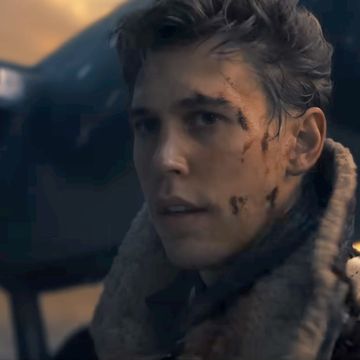With barely a flourish, the first season of Donald Glover's offbeat creative debut Atlanta came to an end. Met with consistent critical praise, the ten-episode season reintroduced us to one of Hollywood's "safest" actors in the last role or city we'd ever expect to find him in. Glover's portrayal as the plagued Earnest Marks — a Princeton dropout turned mediocre music manager — is a success at representing the throes of making it within the American South's most quizzical rap scene. (And to his credit, Glover absolutely nails his goal of illustrating what it's like to be black in what's technically left of Obama's America.) With a series of increasingly bizarre and distressing situations, however, Glover and his team delivered much more than a typical story about "grinding" — they subtly fashioned a universe in which invisible cars, a transracial "white" man, and a Black Justin Bieber run amok. Unlike its peers, Atlanta declines to recount reality and instead creates its own.
Truthfully, even a standard story about the music industry would have been considered ambitious for Glover. After five seasons of playing the endearingly nerdy Troy on Community, Glover had become the hesitant face of the "harmless" black character—a role he sharply (but not fully) detours from as Earnest. Some of Earn's woes can be chalked up to his meek demeanor, which tends to place him peculiar situations that thankfully drive the series along. More tragedy than comedy, Atlanta feels more like a loose series of unfortunate events held together only by Earn's uncanny ability to irritate everyone he knows: his baby's mother and sometimes-girlfriend, Vanessa (Zazie Beetz), his parents, himself, and especially his buzzing rapper cousin, Paper Boi (Brian Tyree Henry). It's quite easy to get lost in the minutiae of Earn's recurring poverty, struggles with young fatherhood, and the city's ubiquitous culture , but Atlanta never really lets us. Just when we find ourselves resigned to Earn's ordinary life, there's always something to remind us that we're not exactly in "Atlanta" anymore.
There are, of course, depictions of the uncomfortable reality of being young and broke, such as Van's impromptu drug test or Earn's night in jail, but even these situations become eerily ludicrous. Vanessa's attempt to harvest clean urine after a night of smoking mimics the frenzied bargains we've all made with our straight-laced friends. But the situation quickly heads south and finally climaxes as a urine-filled balloon explodes into her mouth. While in jail, Earn witnesses the brutal beating of a mentally ill detainee in deafening silence. He later tries to console a man in the midst of a transphobic outburst with his fledgling philosophy on sexuality. Both scenes drag on for minutes longer than necessary, rendering them almost impossible to watch. Even everyday life is put to Glover's magnifying glass. The situations blur the line between relatable and ridiculous so effortlessly that it's difficult to tell where one begins and the other ends.
Then, there's the just plain strange: a Black Justin Bieber, an invisible car peeling out of the scene of a club shooting, a transracial (and ironically homophobic) "White" man (played by viral YouTube star Niles Stewart.) An animated cereal commercial spoofs police brutality so pointedly that it becomes as unbelievable as the tragedies themselves. For seemingly no reason at all, a kid in crude whiteface smirks ghoulishly from the back of Vanessa's classroom. No matter how bizarre the scene, the characters routinely accept the occurrence as fact without ever breaking the fourth wall. The resulting message is clear: we are now in Donald Glover's Atlanta, where anything can, and probably will, happen.
Atlanta's blurred lines places it in the camp of media like Man Seeking Woman, The Simpsons, or The Truman Show than it does that of black-directed contemporaries like Empire, Insecure, or Queen Sugar. Like the former group, Atlanta employs the concept of "hyper reality" — or the "[the viewer's] inability to decipher reality from a simulation of reality." Instead of engaging with the real Atlanta as we know it, we encounter Glover's delightful imitation, a world that flirts openly with the absurd with little comment or remorse. Hyper reality is a trope that lives freely in The Simpsons' fictional suburb-universe "Springfield, USA," where characters' wacky story lines are supplied with a rotating roster of celebrities. Jay Baruchel crafts a surreal, cringe-worthy dating life with the trope on Man Seeking Woman, in which his ex goes on to date Adolf Hitler in the first episode.
By employing the bizarre, Glover distances himself from other black showrunners by playing with reality instead of centering himself fully in it. A measured tradition in black television and film has always sought to recount, document, or imitate the reality of black people via scripted fiction set in current times, reality TV shows, or hyper-detailed historical dramas. Atlanta's peers rarely deviate from this custom while portraying equally entertaining, suspenseful, and comical stories. Shows like Queen Sugar tell a tale of familial love and loss with very real locations like New Orleans and Los Angeles; Insecure exaggerates modern-day dating woes; Empire guest-stars rappers and celebrities to remind you of its supposed realness. In film, the few black stories that eke through are set firmly in reality — though not always in the present, and often with the struggle of slaves, their immediate descendants, or their distant successors. Virulent backlash to black characters featured in treasured fantasy films only make Atlanta that more entertaining when one considers how it so neatly subverts expectations about the realities of "black life" with a fantasy of Glover's making.
Atlanta has since been renewed for a second season, which means we'll likely see its measured madness continue. And it's just as well: despite the fun, the show still manages to drag its feet on its main story line and much-needed character development. There's still much to learn about Earn and friends, and so much more to say on the music industry, black life, and pursuing dreams. If we're lucky, Season Two will unfold even better stories under the warm sun of Donald Glover's Atlanta.
Series 1 of Atlanta is available on Sky Box Sets.














